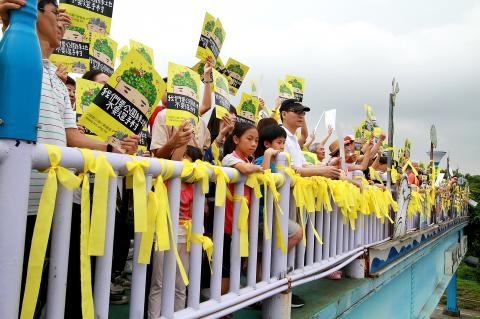An alliance composed of community colleges, social organizations and residents of New Taipei City’s (新北市) Linkou District (林口) yesterday launched a petition against the city’s plan to set up an athletes’ village at Linkou Athletic Park, saying it could damage the ecosystem.
The Taipei City Government in December won the right to host the 2017 Summer Universiade. It said it decided to use the Linkou Athletic Park after discussions with the New Taipei City Government.
However, according to Chang Fan (張璠), an official with New Taipei City’s Urban and Rural Development Department, the Linkou Athletic Park belongs to the central government and the city government does not have the last say in how it is used.

Photo: Tsai Pai-ling, Taipei Times
The New Taipei City Government will definitely side with the residents and convey their wishes to the central government, Chang said, adding that the construction plans for the athletes’ village have not yet been determined and it would try to create a “win-win” situation for both residents and the central government.
Wang Chen-nai (王貞乃), a member of the alliance named the “Referendum to Save the Park Alliance,” said the planned athletes’ village is a large-scale development project, but the process for selecting the site or plans for construction have not been made transparent.
It has even misled people into thinking that construction of the athletes’ village would pose minimal damage to the surrounding natural environment, Wang said.
Wang said the petition has so far received 4,000 signatures. Once it has gathered 10,000 signatures, the group would forward the petition to the New Taipei City Government and it is hoped to immediately halt the development of the athletes’ village.
Translated by Jake Chung, Staff writer

A preclearance service to facilitate entry for people traveling to select airports in Japan would be available from Thursday next week to Feb. 25 at Taiwan Taoyuan International Airport, Taoyuan International Airport Corp (TIAC) said on Tuesday. The service was first made available to Taiwanese travelers throughout the winter vacation of 2024 and during the Lunar New Year holiday. In addition to flights to the Japanese cities of Hakodate, Asahikawa, Akita, Sendai, Niigata, Okayama, Takamatsu, Kumamoto and Kagoshima, the service would be available to travelers to Kobe and Oita. The service can be accessed by passengers of 15 flight routes operated by

Chinese spouse and influencer Guan Guan’s (關關) residency permit has been revoked for repeatedly posting pro-China videos that threaten national security, the National Immigration Agency confirmed today. Guan Guan has said many controversial statements in her videos posted to Douyin (抖音), including “the red flag will soon be painted all over Taiwan” and “Taiwan is an inseparable part of China,” and expressing hope for expedited reunification. The agency last year received multiple reports alleging that Guan Guan had advocated for armed reunification. After verifying the reports, the agency last month issued a notice requiring her to appear and explain her actions. Guan

GIVE AND TAKE: Blood demand continues to rise each year, while fewer young donors are available due to the nation’s falling birthrate, a doctor said Blood donors can redeem points earned from donations to obtain limited edition Formosan black bear travel mugs, the Kaohsiung Blood Center said yesterday, as it announced a goal of stocking 20,000 units of blood prior to the Lunar New Year. The last month of the lunar year is National Blood Donation Month, when local centers seek to stockpile blood for use during the Lunar New Year holiday. The blood demand in southern Taiwan — including Tainan and Kaohsiung, as well as Chiayi, Pingtung, Penghu and Taitung counties — is about 2,000 units per day, the center said. The donation campaign aims to boost

The Central Weather Administration (CWA) said a magnitude 4.9 earthquake that struck off the coast of eastern Taiwan yesterday was an independent event and part of a stress-adjustment process. The earthquake occurred at 4:47pm, with its epicenter at sea about 45.4km south of Yilan County Hall at a depth of 5.9km, the CWA said. The quake's intensity, which gauges the actual effects of a temblor, was highest in several townships in Yilan and neighboring Hualien County, where it measured 4 on Taiwan's seven-tier intensity scale, the CWA said. Lin Po-yu (林柏佑), a division chief at the CWA's Seismological Center, told a news conference